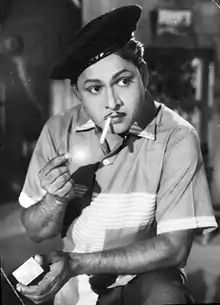K. A. Thangavelu
Karaikal Arunachalam Thangavelu (15 January 1917 – 28 September 1994) popularly known as "Danaal Thangavelu", was an Indian film actor and comedian popular in the 1950s to 1970s. Not known for physical, acrobatic comedy like his contemporaries J. P. Chandrababu and Nagesh, Thangavelu's humor is recognised for his impeccable timing in verbal agility and the characteristic twang of his delivery. He exclusively acted in Tamil films.
K. A. Thangavelu | |
|---|---|
 | |
| Born | Karaikal Arunachalam Thangavelu[1] 15 January 1917 |
| Died | 28 September 1994 (aged 77) Chennai, Tamil Nadu |
| Other names | Danaal Thangavelu |
| Occupation | Actor, comedian |
| Years active | 1936; 1951–1994 |
| Spouse(s) | Rajamani (m. 1943) M. Saroja (m.1959–1994; until his death) |
| Children | Valarmathi
Vijaya Chamundeswari Sumathi |
Early life
Thangavelu was born on 15 January 1917,[2] in Karaikal, but shifted at an early age to Tirumalairayanpattinam. He was one of three sons of Arunachalam and Karumammal. Due to Arunachalam's alcoholism, the family struggled for food everyday. Karumammal died when Thangavelu was six years old, and Arunachalam remarried; Thangavelu's stepmother often abused him.[1] Arunachalam left for Singapore to find better employment and Thangavelu was sent to live with his relatives, but they too abused and ill-treated him.[3] As a child, Thangavelu was a music and theatre fan, often sneaking into halls to watch plays. He eventually joined the Rajambal Company troupe, and was taught acting and mentored originally by Yedhartham Ponnuswamy Pillai, and later by M. Kandaswamy Mudaliar.[1]
Career
Thangavelu spent nine years at Rajambal Company, and after Kandaswamy Mudaliar shifted to the film industry, he too did the same, debuting with a minor, uncredited role in Sathi Leelavathi (1936). Due to lack of success, Thangavelu quit films and survived on alms at a Murugan temple near Kanchipuram until actor M. M. Marappa saw his plight and brought him back into the acting field, this time in theatre. As a result, Thangavelu became more financially stable, and his father also returned to live with him. After a long sabbatical from films, Thangavelu returned to the field in 1951 with Manamagal; director N. S. Krishnan cast him after having already seen and liking his several stage performances. He followed it with a comical role in Singari the same year, through which he got the prefix "Danaal" after the often repeated word of his character. Films like Ponvayal and Panam Paduthum Padu (both released in 1954) were instrumental in establishing Thangavelu as a comedian.[1] Throughout his career, Thangavelu acted only in Tamil films.[3] He had won Tamil Nadu government's Kalaimamani in 1968 and Kalaivanar award in 1989.[4]
Personal life
Thangavelu was originally married to Rajamani.[3] He later married actress M. Saroja who was his pair in more than 50 films. Despite their age difference, they loved and married in Madurai Murugan temple during the 100th day celebration of their film Kalyana Parisu.[5]
Death
Thangavelu died on 28 September 1994 at his house in Chennai, Tamil Nadu.[3] He is survived by his and Saroja's only child, daughter Sumathi.[6]
Filmography
References
- Raman, Mohan V. (24 September 2016). "King of comedy". The Hindu. Archived from the original on 12 December 2018. Retrieved 9 February 2020.
- Kantha, Sachi Sri (19 December 2017). "MGR Remembered – Part 41 – Ilankai Tamil Sangam". Ilankai Tamil Sangam. Archived from the original on 24 December 2017. Retrieved 9 February 2020.
- Majordasan. "Potpourri of titbits about cinema – Thangavelu". Kalyanamalai. Archived from the original on 29 October 2016. Retrieved 9 February 2020.
- "K. A. Thangavelu dead". The Indian Express. 29 September 1994. p. 1.
- Kesavan, N. (26 June 2016). "Comediennes who made Tamil cinema bright". The Hindu. Archived from the original on 27 February 2018. Retrieved 9 February 2020.
- Rangarajan, Malathi (5 April 2012). "Saroja will stay on". The Hindu. Archived from the original on 27 May 2017. Retrieved 9 February 2020.
- Rajanayaham, R. P. (13 November 2015). "நினைவுகளின் சிறகுகள்: கே.ஏ. தங்கவேலு – அண்ணே என்னைச் சுடப்போறாங்க!" [Wings of memories: K. A. Thangavelu – My big brother is going to shoot me!]. The Hindu (Tamil). Archived from the original on 12 November 2019. Retrieved 9 February 2020.
- Guy, Randor (14 January 2012). "Ponvayal 1954". The Hindu. Archived from the original on 9 February 2020. Retrieved 9 February 2020.
- அலிபாபாவும் 40 திருடர்களும் [Alibaba and the Forty Thieves] (songbook) (in Tamil). Modern Theatres. c. 1956. Archived from the original on 1 August 2020. Alt URL
- Guy, Randor (7 September 2013). "Adutha Veettu Penn 1960". The Hindu. Archived from the original on 8 September 2013. Retrieved 7 September 2013.
- வாசு பிலிம்ஸ் கைராசி (பாட்டுப் புத்தகம்) (in Tamil). Chennai: Sri Kamakoti Printers, Moor Road, Chennai-1. 1960. Archived from the original on 23 June 2019. Retrieved 9 February 2020.
- Guy, Randor (7 February 2015). "Naan Kanda Sorgam 1960". The Hindu. Archived from the original on 5 March 2017. Retrieved 9 February 2020.